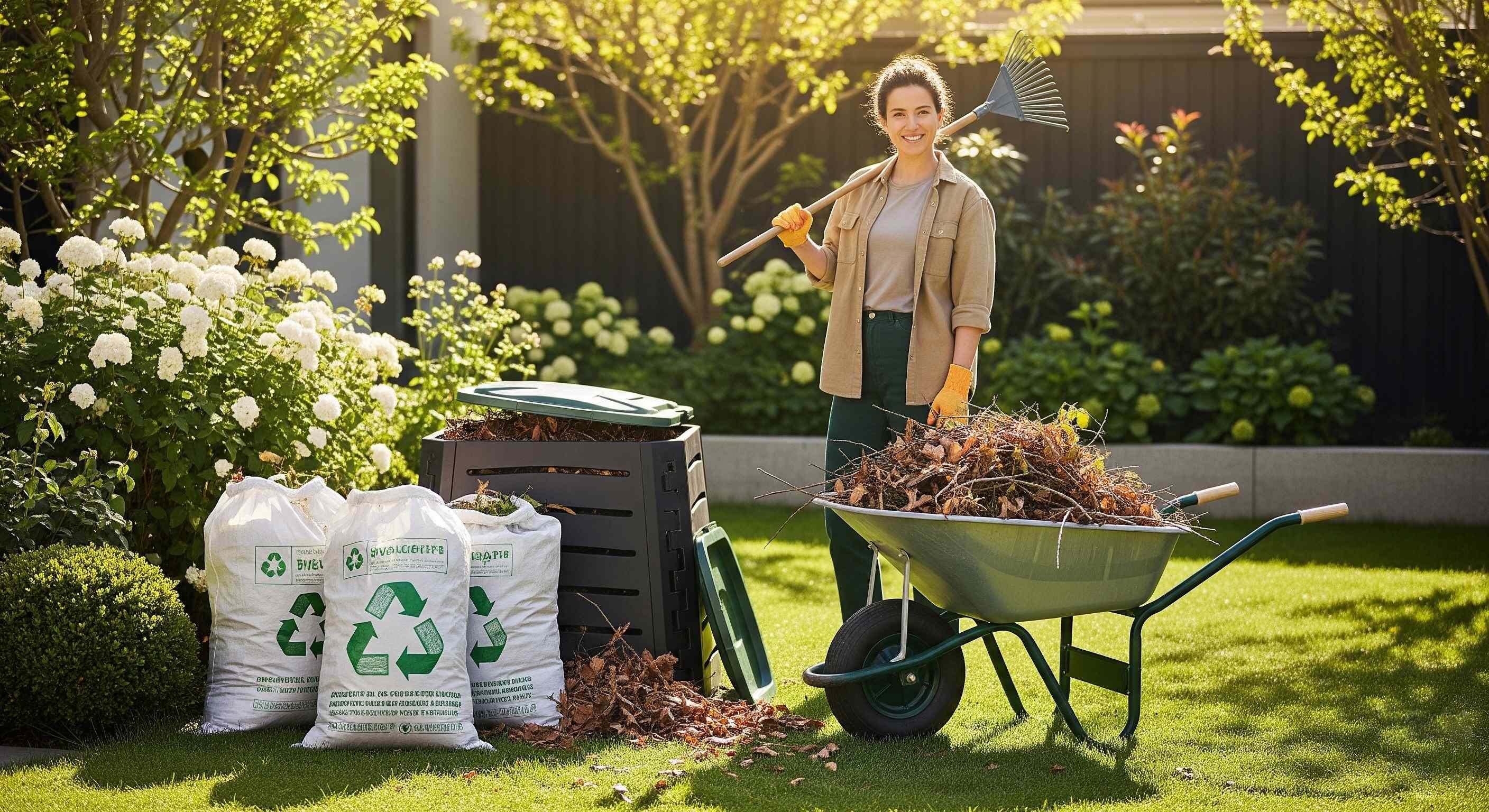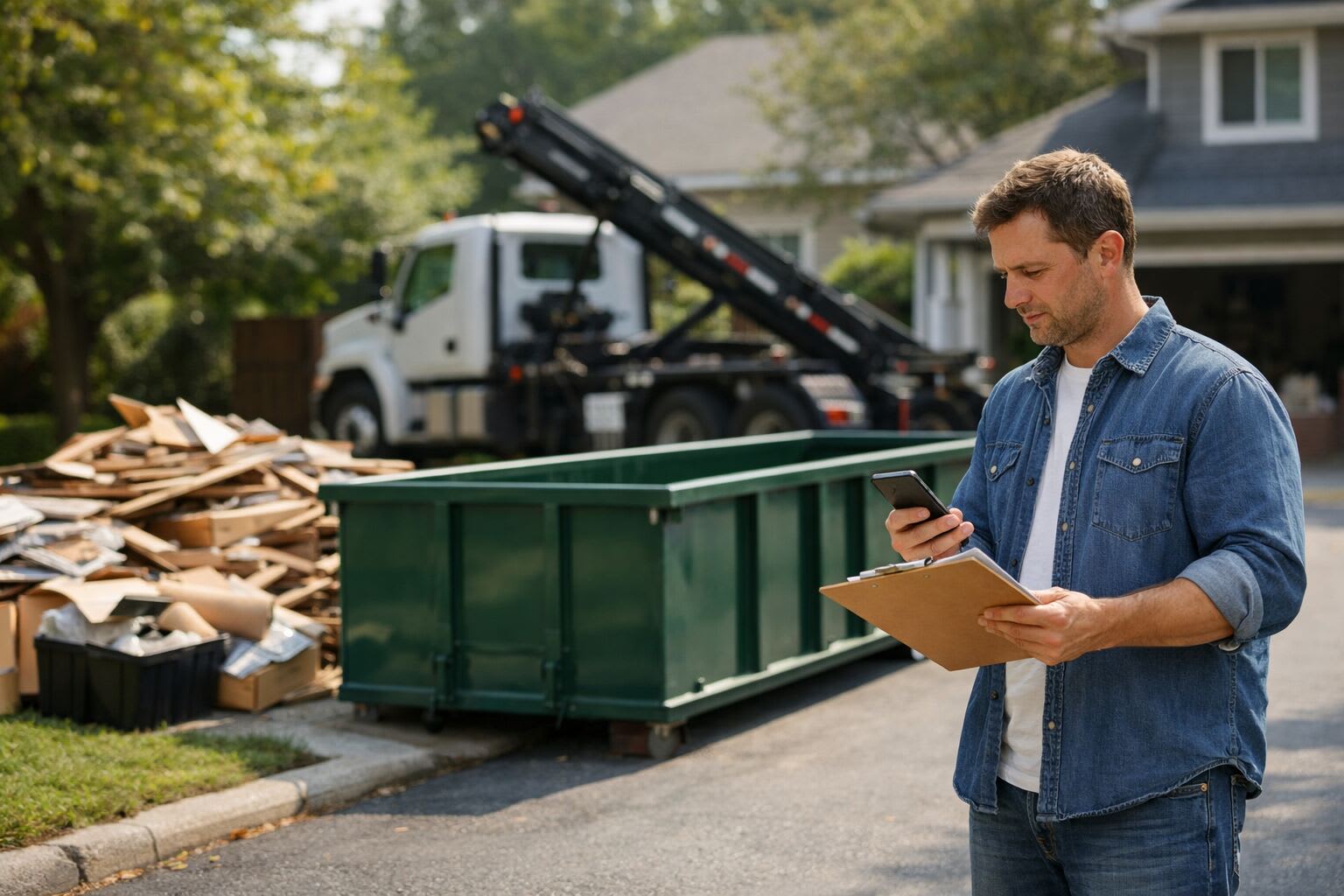BLOG / HOW TO
How to Dispose of Yard Waste


Keeping your yard looking great is satisfying but dealing with the aftermath? Not so much. Piles of grass clippings, fallen leaves, and tree branches can quickly turn your beautiful outdoor space into a messy headache. Simply tossing it all in the trash isn’t always an option. Many cities have strict rules, and dumping it can harm the environment.
The good news? There are plenty of smart, affordable, and eco-friendly ways to get rid of yard waste without the stress. Whether you want to recycle, compost, reuse, or hire a pro, this guide will walk you through every option, so you can enjoy a clean, beautiful yard all year round.
What Counts as Yard Waste
Understanding what counts as yard waste is the first step toward smarter disposal and eco-friendly lawn care. Yard waste includes all the natural debris that comes from maintaining your lawn and garden like thick leaves, grass clippings, branches, twigs, and other green waste.
Each type of yard waste needs to be handled differently, and some can even be repurposed into mulch or compost instead of ending up in a landfill. By learning how to separate and manage these common yard waste materials, homeowners can keep their yards looking great, reduce the strain on local trash facilities, and do their part for the environment.
Types of Yard Waste
Yard waste includes all the natural debris that accumulates while maintaining your lawn or garden. Common types include grass clippings, which pile up quickly after mowing and can be composted or used as mulch. Fallen leaves are another major type, especially in autumn, and can be bagged, mulched, or composted to keep your yard clean. Branches and twigs, often from pruning or storms, can be chipped into mulch or bundled for pickup. Weeds, dead plants, and garden trimmings also count as yard waste and are ideal for composting if they are not diseased. Large items like shrubs and tree stumps usually require special disposal methods, such as hauling services or stump grinding.
8 Best Ways to Dispose of Yard Waste
When it comes to efficiently managing yard waste, homeowners have a number of options. The following are some of the finest methods for getting rid of yard waste:
-
Rent a Dumpster
Renting a dumpster is an efficient and convenient way to handle yard waste removal, especially for large-scale cleanups or landscaping projects. With a variety of sizes available, you can choose the one that best fits your needs.
Dumpster rental companies typically deliver the container directly to your property. You can fill it with yard debris such as grass clippings, branches, leaves, and even larger items like shed materials. Once you're done, schedule a pickup, and the company will haul away the waste for proper disposal. Ensure you follow the company's guidelines regarding acceptable materials and weight limits.
Learn More: Dumpster Rental Vs Junk Removal
Cost Breakdown
The cost of renting a dumpster varies based on size, location, and rental duration. Here's a general overview of average costs:
| Dumpster Size | Capacity | Ideal For | Average Cost (per week) |
|---|---|---|---|
| 10-yard | Up to 1 ton | Small yard projects | $150 – $600 |
| 20-yard | Up to 2 tons | Medium yard cleanups, home renovations | $250 – $1,100 |
| 30-yard | Up to 3 tons | Large yard projects, major cleanouts | $260 – $1,200 |
| 40-yard | Up to 4 tons | Major construction, large-scale cleanups | $300 – $1300 |
-
Use Municipal Yard Waste Collection Services
Many cities and municipalities provide yard waste removal and recycling as part of their local trash collection service. Some offer curbside pickup on certain collection days.
Check with your municipality to see if they offer yard waste service, and inquire about the collection schedule. Depending on where you live, many services may not be available or free.
-
Take Waste to a Recycling Drop-off Site
You can dispose of your yard waste to be converted into compost at designated drop-off locations in many places. To find out if your municipality has a site, you can either call your public works department or search for nearby small firms that offer this service, which frequently turns yard waste into mulch.
There may be restrictions on what and how much you can dispose of, as well as how it should be prepared for disposal, and most sites have set operating hours. There might be staff available to help you. Although most websites offer the service for free, some could demand a fee.
-
Hire a Professional Yard Waste Disposal Service
If you want a hassle-free solution, consider hiring a professional waste disposal service. These companies handle almost every type of waste and offer both one-time pickups and recurring curbside collections, perfect for busy homeowners or businesses. Many even provide eco-friendly recycling options to help you stay green.
Before booking, take a few minutes to compare prices and packages, since costs can add up quickly depending on your location and service needs. On average, you can expect to pay between $15–$25 per cubic yard, which usually comes out to $150–$300 per visit. Most providers also have a minimum load charge of $70–$80, so it’s best to plan your pickup efficiently to get the most value for your money.
-
Burn Your Yard Waste (If Legal and Safe)
Burning your yard waste can be one of the quickest ways to get rid of it, but don’t light that match without checking the rules first! Always review your state’s regulations to confirm if burning is legal in your area and learn what materials you can burn during different times of the year.
For example, in states like California, you may need a burn permit before you start. Burning is often restricted during wildfire season, and there may also be rules about the size of your pile. For safety, a four-foot pile is generally the recommended limit.
If you go with this method, keep safety top of mind. Only burn yard waste in a well-controlled environment with access to water, a hose or buckets are essential. Avoid burning on windy or extremely dry days. Make sure there are no obstructions, such as power lines, overhanging branches, or nearby buildings. Create a 10-foot safety zone of gravel or bare soil around the fire, and never walk away until the fire is completely out.
-
Compost Your Yard Waste
Composting is one of the easiest and most eco-friendly ways to turn everyday waste into “black gold” for your garden. By letting nature do its work, you can transform yard waste and food scraps into a nutrient-packed soil booster that keeps your plants thriving.
Almost any organic material can go into your compost, from grass clippings, leaves, and plant trimmings to kitchen scraps like fruit peels and coffee grounds. Whether you keep it simple with a backyard pile, invest in a compost bin, or build your own DIY compost system, the process is low-cost and highly rewarding.
Adding compost to your garden doesn’t just feed your soil, it helps lock in moisture, reduce erosion, and supercharge plant growth naturally. If you want a greener, healthier garden and a more sustainable way to deal with waste, composting is the perfect solution.
-
Turn the Waste into Mulch
Mulching is a method of turning organic waste into something that benefits the health of your garden, much like compost. Mulch covers the soil and surrounds plants, keeping them hydrated and shielding them from elements like wind and weeds.
Mulch can be made from grass clippings, dried leaves, chipped branches, and tree stumps. To expand your mulch, you can also utilize gravel and boulders, which are typically not recyclable at a waste collection facility.
-
Work with Your Local Community
Your neighborhood could have hidden gems for sustainable waste disposal like community composting programs that welcome donations from local residents. Not sure where to start? Platforms like ShareWaste make it easy to connect with nearby individuals or organizations who accept food scraps and yard waste for composting. Also, many local governments now offer yard waste collection services that turn clippings, leaves, and branches into nutrient-rich compost or mulch often available for residents to pick up for free or at a low cost.
Effective Strategies for Yard Waste Disposal and Recycling
Maintaining a clean outdoor area and lessening your influence on the environment depend on correctly disposing of yard trash. Homeowners must take part in recycling and composting programs and follow municipal disposal laws. Effective management of garden waste is ensured by taking into account the quantity, sustainability, and expenses related to the different disposal techniques.
Ultimately, making educated decisions about how to dispose of yard trash helps the community achieve its waste reduction objectives and creates a cleaner environment. You can contact us for a more individualized experience or go through our other blogs if you have any questions.
Know More: Fall Yard Waste Cleanup Checklist
End Note
You do not need to struggle with yard waste. You compost at home, use community programs, or rely on municipal collection services for eco-friendly disposal. Choosing sustainable methods keeps your yard clean and supports greener, healthier communities. You turn yard waste into valuable compost or mulch and make a positive impact today.
Frequently Asked Questions
Can I put yard waste in my regular trash or recycling bin?
Most cities don’t allow yard waste in regular trash because it can be composted or recycled. Check your local waste management rules to avoid fines and ensure proper disposal.
How can I get rid of yard waste at home?
You can compost it in your backyard, use a mulching mower for grass clippings, or set up a dedicated yard waste bin for municipal pickup. Composting not only reduces waste but also creates nutrient-rich soil for your garden.
Can I donate yard waste?
Absolutely! Platforms like ShareWaste or local community gardens accept yard waste donations to turn into compost. It’s a sustainable way to reduce landfill waste and support local gardens.
What are eco-friendly alternatives to dispose of yard waste?
Besides composting, you can chip branches into mulch, use a green waste drop-off site, or hire eco-conscious junk removal services that recycle yard waste responsibly.
Sabbir Kabir is a content manager at WeCycle with over 5 years of experience in creating content about junk removal services, eco-friendly waste disposal, and sustainable recycling practices. Passionate about promoting environmental responsibility, Sabbir shares actionable insights to help homeowners and businesses adopt greener, cleaner waste management solutions.
Read our latest blog posts
Need junk gone fast? See pricing in your area
Enter your zip code to see if Wecycle operates in your location.



